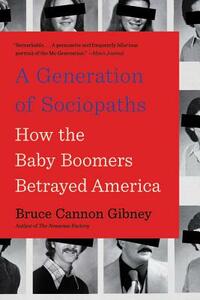Take a photo of a barcode or cover
196 reviews for:
A Generation of Sociopaths: How the Baby Boomers Betrayed America
Bruce Cannon Gibney
196 reviews for:
A Generation of Sociopaths: How the Baby Boomers Betrayed America
Bruce Cannon Gibney
I intensely disagree with a lot of Gibney's conclusions and proposed solutions as they amount to an awful lot of billionaire apologist rhetoric, but his look at the motives and psychology of the Boomer generation, is well worth the time invested in this read.
Ok, I am a resentful GenXer. The older kids got all the fun in the seventies and we got the authoritarian backlash of the eighties and Madonna. So a takedown of that generation satisfies me greatly. However, I don't think generational analysis or psych profiles of age cohorts are really fair or good analyses. It is a game of generational stereotypes. Frankly, it is more a process in time with class warfare, a degenerating political economy, and the profit motive of capitalism which brought on the process of corrosion of vital institutions. So while the spleen on baby boomers is a guilty pleasure I don't go by that method and I don't think it is ultimately a good diagnosis of our troubles.
Admittedly I only read about 80 pages, but it's always disappointing when you agree with the overall point of a book like this, only to have the author's arguments be as vapid as they are here. Permissive parenting, tv, drugs, divorce - all these "problems" still exist today and don't seem to have the same generational impact as they had on the Boomers.
Perhaps Mr. Gibney eventually gets into how the Boomer generation inherited the most economically mobile society in human history and simply felt they got theirs and now they want to keep it. Besides, hard work was all they needed, not welfare and entitlements (oops, sorry, we totally overlooked the amazing leaps in technology, infrastructure, travel, and social betterment that were created with public spending), so why can't subsequent generations pull up their bootstraps like they did? Yeah, maybe Mr. Gibney goes there eventually and digs deeper into it, but honestly, I'm not beating my brain against this book any more to find out.
Perhaps Mr. Gibney eventually gets into how the Boomer generation inherited the most economically mobile society in human history and simply felt they got theirs and now they want to keep it. Besides, hard work was all they needed, not welfare and entitlements (oops, sorry, we totally overlooked the amazing leaps in technology, infrastructure, travel, and social betterment that were created with public spending), so why can't subsequent generations pull up their bootstraps like they did? Yeah, maybe Mr. Gibney goes there eventually and digs deeper into it, but honestly, I'm not beating my brain against this book any more to find out.
medium-paced
Self-serving, self-centered, self-gratifying, self-promoting and probably a few more "selfs" basically describes the boomer generation, especially the biggest bubble sections where the sheer population swell caused such a boom. Too long told how special they were, they internalized the story and felt entitled to everything they could get for themselves. So focused on their own reflections they couldn't bear to look away and see the damage their greed was causing. Now, of course it isn't ALL of this generation that have made such a mess of things. It is, however, a controlling majority that have. They want their cake and the cakes everyone who came after them.
A horrifying and timely book . . .
So, to clarify - the author is clear that he is not saying that each and every member of the Baby Boom generation is a sociopath. But on the whole, since its very inception, the behavior of the generation as a whole has been and continues to be textbook sociopathy (what textbook? The DSM!). Gibney lays out what made the Boomers different from every generation before or since them, and demonstrates how they inherited prosperity unequaled in human history . . . and squandered it. Then, when it was gone, they started spending the patrimony of their children and grandchildren, and despoiled the very planet to the point where it may be past saving, so that they have endangered the very future of the entire human race. Possible remedies, mostly for the financial situation of the United States, are proposed, but it is noted that the Boomers still have enough sway to make it difficult to implement the solutions until it is too late to save anybody. A timely book for everyone who is looking around and wondering, "WHAT HAPPENED?" The answer: the Baby Boom happened. And this is the story of exactly how we got to be where we are now.
So, to clarify - the author is clear that he is not saying that each and every member of the Baby Boom generation is a sociopath. But on the whole, since its very inception, the behavior of the generation as a whole has been and continues to be textbook sociopathy (what textbook? The DSM!). Gibney lays out what made the Boomers different from every generation before or since them, and demonstrates how they inherited prosperity unequaled in human history . . . and squandered it. Then, when it was gone, they started spending the patrimony of their children and grandchildren, and despoiled the very planet to the point where it may be past saving, so that they have endangered the very future of the entire human race. Possible remedies, mostly for the financial situation of the United States, are proposed, but it is noted that the Boomers still have enough sway to make it difficult to implement the solutions until it is too late to save anybody. A timely book for everyone who is looking around and wondering, "WHAT HAPPENED?" The answer: the Baby Boom happened. And this is the story of exactly how we got to be where we are now.
This book’s title is very incendiary, which is how it caught my attention at the bookstore. This book essentially makes two propositions:
1. Baby boomers are leaving the country (US) worse off for their children and future generations, and
2. The baby boomer generation (mostly focused on white, American baby boomers) is doing this because it is essentially sociopathic.
The first proposition is very likely true based on the arguments and facts laid out in the book. There are so many different types of examples, just to name a few:
1. Boomers rolled back research and development (investing in the future),
2. Boomers enacted deregulation on mass but provided government bailouts for poor, short-sighted decisions,
3. Boomers oversaw the largest divestment in education and placed almost all the cost onto later generations,
4. Boomers chose not to make Social Security, Medicare, and pensions in general solvent for future generations,
5. Boomers enacted tax policy that shifted wealth from prior and future generations to themselves,
6. Boomers failed to protect the environment for future generations.
Really, this list could go on and on, which it does in the book. I think the book definitely makes a strong argument for the first proposition.
The second proposition (boomer generation is sociopathic) is not as clear to me, although as I progressed through the book, I think the case became much stronger. Sociopathy is a charged word for a reason (think of serial killers or people that are incapable of feeling guilt or empathy), and I’m not sure that the book completely convinced me of this idea – rather, I think it makes a much better case for anti-social behavior like choosing expediency over long-term planning, focusing more on the self rather than the fabric of the social contract, etc.
Overall, I think this book is very thought-provoking despite some weaknesses in some of the arguments. We see opinion polling based on gender, race, politics, religion, and education all the time, but age is often not touted in terms of generations. It’s a different way of looking at things and provides a bigger picture and a different perspective.
1. Baby boomers are leaving the country (US) worse off for their children and future generations, and
2. The baby boomer generation (mostly focused on white, American baby boomers) is doing this because it is essentially sociopathic.
The first proposition is very likely true based on the arguments and facts laid out in the book. There are so many different types of examples, just to name a few:
1. Boomers rolled back research and development (investing in the future),
2. Boomers enacted deregulation on mass but provided government bailouts for poor, short-sighted decisions,
3. Boomers oversaw the largest divestment in education and placed almost all the cost onto later generations,
4. Boomers chose not to make Social Security, Medicare, and pensions in general solvent for future generations,
5. Boomers enacted tax policy that shifted wealth from prior and future generations to themselves,
6. Boomers failed to protect the environment for future generations.
Really, this list could go on and on, which it does in the book. I think the book definitely makes a strong argument for the first proposition.
The second proposition (boomer generation is sociopathic) is not as clear to me, although as I progressed through the book, I think the case became much stronger. Sociopathy is a charged word for a reason (think of serial killers or people that are incapable of feeling guilt or empathy), and I’m not sure that the book completely convinced me of this idea – rather, I think it makes a much better case for anti-social behavior like choosing expediency over long-term planning, focusing more on the self rather than the fabric of the social contract, etc.
Overall, I think this book is very thought-provoking despite some weaknesses in some of the arguments. We see opinion polling based on gender, race, politics, religion, and education all the time, but age is often not touted in terms of generations. It’s a different way of looking at things and provides a bigger picture and a different perspective.
The author does a fair job of presenting the data and arguing for it. I was largely won over by it. However he is limited in his persuasiveness by:
1) having published before the advent of Covid and the debacle that followed,
2) his limited dive into the complexities of race (his reference to African Americans as “the blacks” throughout the entire book was jarring and unappealing to say the very least),
3) his brushing over of the rise and influence of the religious right and how it coincided with with rise and influence of boomers, and
4) his own existence within a peer group populated by millionaires and billionaires. I found it difficult to take his “taxing the 1% wouldn’t help that much” seriously when even the most cursory search of his name has him in circles including Elon Musk, Mark Zuckerberg, and Peter Thiel.
That being said, he is right that the boomers are problematic and that it’s up to subsequent generations as well as a conscientious minority of boomers to begin to fix the mess we’re in.
1) having published before the advent of Covid and the debacle that followed,
2) his limited dive into the complexities of race (his reference to African Americans as “the blacks” throughout the entire book was jarring and unappealing to say the very least),
3) his brushing over of the rise and influence of the religious right and how it coincided with with rise and influence of boomers, and
4) his own existence within a peer group populated by millionaires and billionaires. I found it difficult to take his “taxing the 1% wouldn’t help that much” seriously when even the most cursory search of his name has him in circles including Elon Musk, Mark Zuckerberg, and Peter Thiel.
That being said, he is right that the boomers are problematic and that it’s up to subsequent generations as well as a conscientious minority of boomers to begin to fix the mess we’re in.
Interesting facts and fair argument. Much of it could be said about other generations though…






